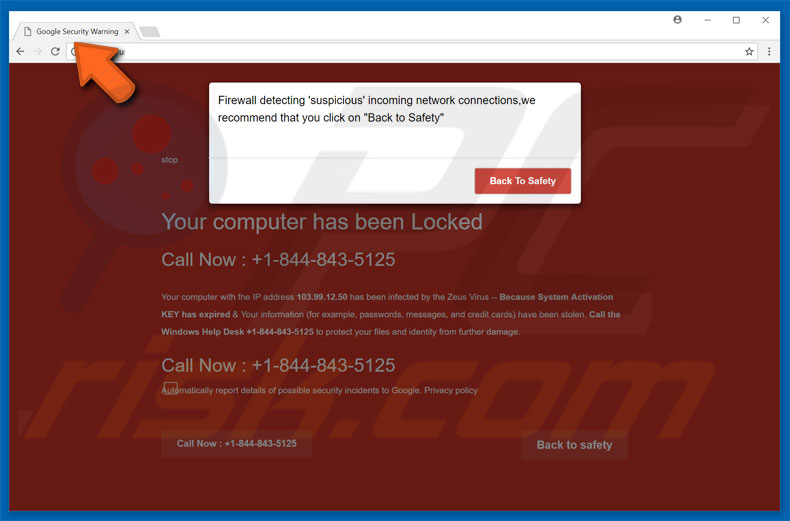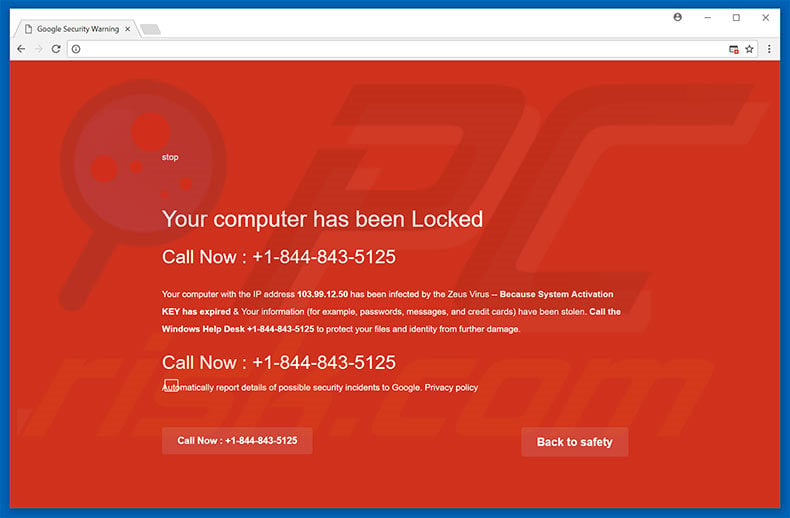What is Google Security Warning?
"Google Security Warning" is a fake error message displayed by a malicious website that users visit inadvertently - they are redirected by various potentially unwanted programs (PUPs). Research shows that these apps often infiltrate systems without consent. As well as causing redirects, PUPs track Internet browsing activity and deliver intrusive online advertisements.

"Google Security Warning" error states that the system has been infected with the Zeus virus (because the system activation key has expired) and that private information (logins/passwords, banking information, etc.) has been stolen. It goes on to state that the malware must be uninstalled immediately and victims are encouraged to contact Windows Help Desk via a telephone number ("+1-844-843-5125") provided. They will then supposedly receive help in resolving this issue. Note that "Google Security Warning" error is fake - a scam that has nothing to do with actual Microsoft and Google companies. Cyber criminals attempt to trick users into believing that the system is infected so that they call and pay for services that are not required. Never call the aforementioned number. This error can be easily removed by simply closing the web browser. As mentioned above, PUPs also monitor browsing activity by gathering various information that might be personally identifiable. The collected data (IP addresses, website URLs visited, pages viewed, search queries, etc.) is later shared with third parties (potentially, cyber criminals) who aim to increase their income by misusing personal details. For this reason, the presence of data-tracking applications can lead to serious privacy issues or even identity theft. Another downside is display of intrusive online advertisements. PUPs continually deliver pop-up, coupon, banner, full-page, and other similar ads. To achieve this, developers employ various tools that enable placement of third party graphical content on any site. Therefore, intrusive ads often conceal underlying website content, thereby significantly diminishing browsing quality. In addition, some of these ads might redirect to malicious websites or even execute scripts designed to download and install PUPs/malware. Therefore, even accidental clicks can result in high-risk computer infections. For these reasons, uninstall all PUPs immediately.

There are dozens of fake errors similar to "Google Security Warning". The list of examples includes (but is not limited to) High Priority Message, Unusual Activity, Warning! Malware Detected!, and Unauthorized Access Detected ! All claims that the system is infected, hijacked, missing files, or damaged in other similar ways, however, as with Google Security Warning, these errors are designed only to trick users into paying for unnecessary services. They should be ignored. PUPs are virtually identical. Most offer various "useful features", but these claims are merely attempts to give the impression of legitimacy. The only purpose of all PUPs is to generate revenue for the developers. They cause unwanted redirects (thereby promoting various websites, most of which are fake search engines), deliver intrusive ads, and collect various user-system information. Note that fake search engines also have an identical purpose and their behavior barely differs from that of PUPs: they also promote other websites (by generating false search results), display ads, and gather data. As with intrusive ads, false search results can lead to malicious websites. Therefore, fake search engines pose a direct threat to your privacy and Internet browsing safety.
How did adware install on my computer?
To proliferate PUPs, developers employ intrusive online ads and a deceptive marketing method called "bundling" - stealth installation of third party applications with regular (mostly free) software/programs. Therefore, PUPs usually infiltrate systems without consent. Developers hide bundled apps within the "Custom/Advanced" settings of the download/installation processes. Rushing/skipping this section and clicking ads, exposes systems to risk of various infections, compromises users' privacy, and inadvertently grants set-ups permission to modify various options.
How to avoid installation of potentially unwanted applications?
PUPs are distributed using intrusive ads and via bundling. Therefore, be very cautious when browsing the Internet and especially when downloading/installing software. Avoid clicking ads - intrusive ads may seem genuine and, thus, determining if they originate from the visited (legitimate) website is virtually impossible. No matter how tempting the ads may appear, do not take the risk of clicking them. Furthermore, download your software from trusted sources only. Select a direct download URL rather than using third party downloaders/installers. These tools commonly bundle additional apps and using them is very risky. Select the "Custom/Advanced" settings, carefully analyze each step, and decline offers to download/install additional apps.
Text presented within "Google Security Warning" pop-up:
Firewall detecting ‘suspicious’ incoming network connections, we recommend that you click on “Back to Safety”
Screenshot of website displaying "Google Security Warning" fake error:

Text presented within this website:
Your computer has been Locked
Call Now: +1-844-843-5125
Your computer with the IP address - has been infected by the Zeus Virus - Because System Activation KEY has expired & Your Information (for example, password, messages, and credit cards) have been stolen. Call the Windows Help Desk +1-844-843-5125 to protect your files and identity from further damage.
Call Now: +1-844-843-5125
Comments
Post a Comment